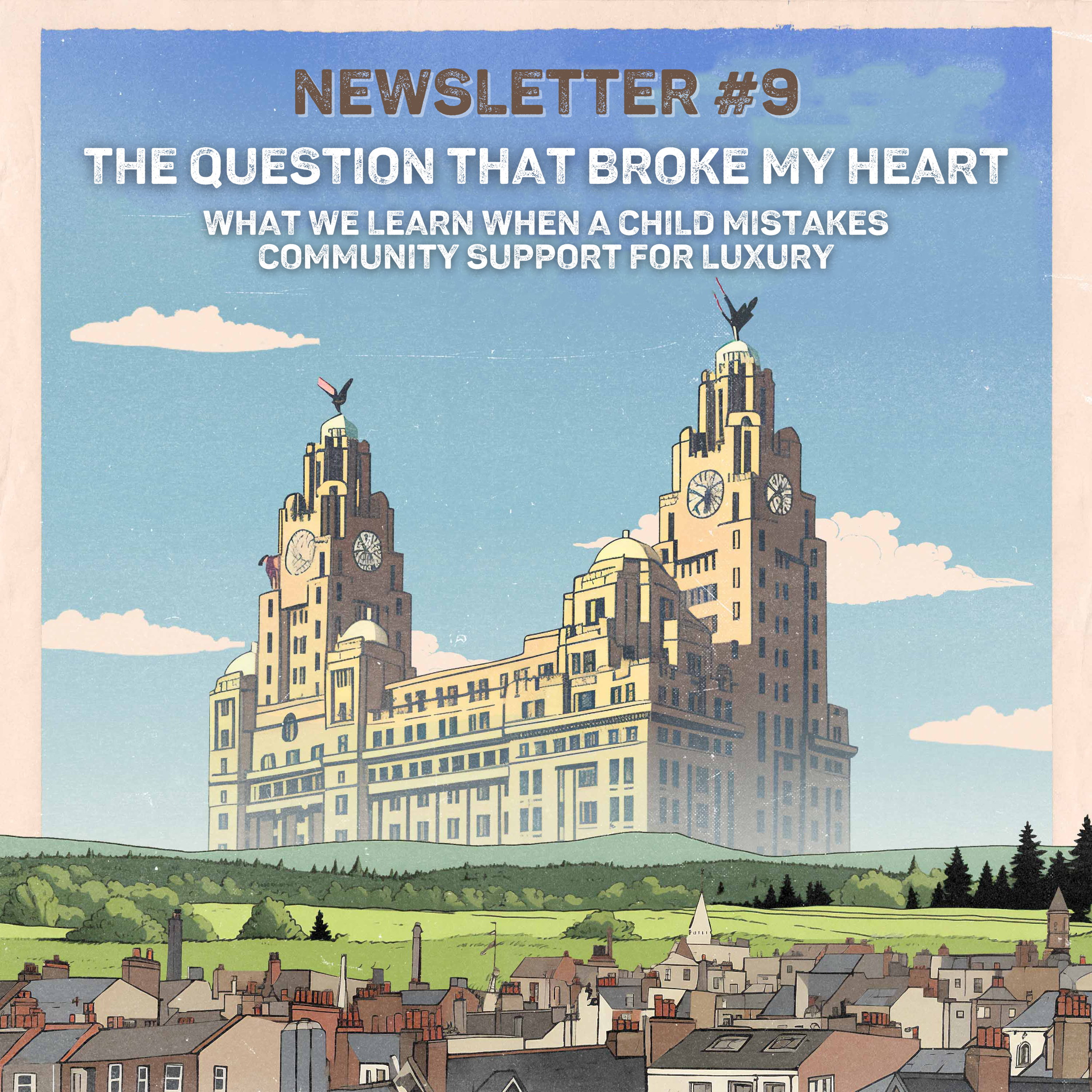Welcome to the ninth edition of the This is the North podcast newsletter.
The Question That Broke My Heart:
What We Learn When a Child Mistakes Community Support for Luxury
By Alison Dunn, with insights from Mark Squires and Ben Roman.
The Lighthouse Project
Recently, I sat down with Mark Squires and Ben Roman about the Lighthouse Project that I can't stop thinking about. As someone who sees families exhausted by fragmented systems daily at Citizens Advice Gateshead, I thought I understood how broken our support structures had become. But sometimes you hear something that makes you see the whole system differently.
This was one of those moments.
"One young lad just walking into the space for the first time tugged at his teacher and said, 'Is this a five-star luxury hotel?" Mark told me, and I had to pause.
That boy wasn't being cute. He was recognising something his community had never seen before: a place built to their potential, not their problems. The fact that basic quality and dignity struck him as luxury should shame every one of us who's accepted that communities like Byker deserve "make-do-and-mend."
Mark's description crystallised something I witness constantly in my role. Years earlier, visiting another youth charity, he'd been led "around the back, past the bins, up back stairs to a space that had some facilities, but it was very much a make-do-and-mend approach." The unspoken message was brutal: "I'm sorry kids, but this is the best you're gonna get. You don't deserve any better." Every day, families arrive at our doors exhausted by exactly this pattern. Bounced between services, treated as problems to be managed rather than people deserving dignity.
What struck me most wasn't the transformation itself, it was discovering how deliberately we've been scattering families across systems designed to exhaust rather than support them. Most support sends people from office to office, appointment to appointment, through bureaucracies they can't decode. A parent seeking housing help gets dropped out of systems that are supposedly there to help.
Ben Roman put it perfectly: they're not trying to do everything themselves. They're "dropping a pebble in the lake" by bringing services together under one roof. Housing help, job training, digital literacy, childcare—all in the same space.
It's so obvious I wanted to scream: why aren't we doing this everywhere!?
I saw this year's GCSE results. When I read that London achieved 72.5% of entries graded at least 4/C while the West Midlands managed only 63.1%, I wanted to throw something. That's a 9.4-point gap - wider than the 6.8 points before the pandemic.
This is exactly what Mark and Ben are fighting against. As Chris Zarraga of Schools North East put it, the results "map the disproportionate impact of the pandemic and cost-of-living crises, as well as the long-term perennial educational challenges that regions like the North East face."
But here's what made it personal: imagine a mother in tears because her teenager had missed a crucial assignment deadline. The homework was online-only, but their laptop had broken, and they couldn't afford the repair. Her daughter had tried completing it on her phone, typing essays with her thumbs, but couldn't submit the file format the school required. That's the reality for 1.6 million people estimated to be living offline in the UK. So when Ben told me "Digital inclusion should just be a given for us as an organisation," I thought of those 1.6 million people. The Lighthouse Project spent "a phenomenal amount of money" on superfast broadband because they understood something policy often misses: digital exclusion isn't just inconvenience, it's a barrier to everything.
What surprised me most was who's investing. This isn't charity, it's recognition of economic necessity. British Engines committed ten years of funding. Ringtons pledged five years of revenue support.
As Ben explained: "Overt discrimination on the grounds of socioeconomic disadvantage is a real thing actually." Having businesses rooted in communities willing to support social mobility isn't corporate responsibility, it's about having a workforce and customer base that can actually thrive.
The story Mark shared about Charlie Renwick of Lycetts particularly moved me. He discovered his great-great-grandmother had opened the original church hall in 1928. Now he's helping open it again, a century later. That's not coincidence, that's community continuity that we've forgotten how to value.
This conversation reminded me of something we wrote recently about transforming entire regions: "The measure of success for any economic strategy must ultimately be whether a child born today in Newcastle, Sunderland, or Durham has the same opportunities as one born in Cambridge or Surrey."
That boy asking about the luxury hotel wasn't just recognising quality, he was glimpsing what equal opportunity actually looks like. And that's what made me angry: we've normalised such low expectations that basic dignity strikes children as extraordinary.
When Praful Nargund told me about visiting a green skills bootcamp in North Shields—"Training up people with no qualifications to go and work in offshore wind... entry level job, 37 grand, that's transformative"—I thought of Ben's vision for the Lighthouse Project.
Both understand that investment in people isn't charity; it's economic infrastructure. That's what this is really about, not just opportunities, but opportunities that actually pay enough to build a life.
The Lighthouse Project isn't just community development; it's the backbone of a place where people can actually thrive. By expanding this model across the Northeast, we can do something rare: create rooms where business leaders, council officials, and community organizers sit at the same table and make promises that survive elections. That's the beauty of real connection - empathy, understanding and a willingness to deliver change.
The boy's wonder at walking into something beautiful should be every child's experience of public investment, not a rare exception. Until it is, we'll keep watching talent leave, businesses struggle to find workers, and communities accept that "make-do-and-mend" is the best they deserve.
So often I hear people say to me "I want to stay here. Build here. But I need to see a future worth building"—words which echo that boy's question. One in wonder, the other in frustration. Both asking: could this really be for us?
Until next time,
Alison.
Listen to the full This is the North podcast:
> Spotify
> Apple Podcasts
If you enjoyed this newsletter, please like, share and subscribe. It takes less than 10 seconds and makes you part of something essential: a community of people who believe transformative conversations can become catalysts for positive change.
This Is The North is your source for transformative conversations that challenge systems holding back the North of England. Hosted by Alison Dunn, supported by Society Matters Foundation.

A deep dive into the archive…
This week a deep dive into our archive takes me to episode 30 with Praful Nargund, because when Praful told me about visiting a green skills bootcamp in North Shields—"Training up people with no qualifications to go and work in offshore wind... entry level job, 37 grand, that's transformative"—I couldn’t help but see the synergy between that and the vision for the Lighthouse Project.
Both understand that investment in people isn't charity; it's economic infrastructure which is so very important, not just opportunities, but opportunities that actually pay enough to build a life, community that wraps around each and every person to give a sense of security and belonging – a place to have fun, build connection, learn new skills, test out a different perspective – building community and providing inclusive growth, growth that brings everyone on the journey to prosperity.
This week I have been listening to…
BBC Sounds, Human Intelligence, released 13th January 2025, entitled Teachers: Michael Faraday. I didn’t seek this episode out, it just happened to be playing on a drive home one day, but the circumstances of Faraday’s rise really struck me as having similarities to the Lighthouse Project and what they are trying to achieve for the people of Byker.
Faraday was the son of a blacksmith, he had limited early years education and yet, he had a meticulous, relentless brain that led others in positions of influence and education to assist him to progress. For example, Faraday worked for a book binder, who allowed him to read some of the scientific publications and to do some experiments in the workshop. This kindness sparked a revolution in how we understand electricity.
Who knows what the Lighthouse Project with business supporters and mentors like British Engines, Ringtons and Lycetts can do for the community of Byker? Our next innovator might just be in the Lighthouse Project E-sports room, on their multi-sport pitch, or playing the drums in their music room!
This week I visited…
In my role as a Trustee of Point North Community Foundation, I had the privilege to visit Greenhills Community Centre in Wheatley Hill, County Durham, just one of the many organisations supported by Point North.
For those who may not be familiar with Point North, the organisation works with donors and supporters who want to make a difference in the lives of local people, and my goodness me what a great example of this is offered by the Greenhills Community Centre which provides a huge range of essential services for their community, everything from soft play, to bike mechanics, from home cooked meals through to employability.
Point North manages the process of getting donated funds to the places where they can make the most difference to the most people. This is done through grants to community groups or voluntary organisations, distributed via an application process. Greenhills is a shining example of what can be done when there’s a determination to move the dial in a place that could easily have become forgotten. Greenhills is a force of nature, it refuses to be forgotten, and with the help of Point North and others, it’s delivering phenomenal outcomes for local people, changing fortunes and doggedly pushing on every single day.
Click on this link to make a donation or find out more about the work of Point North Community Foundation | Home

